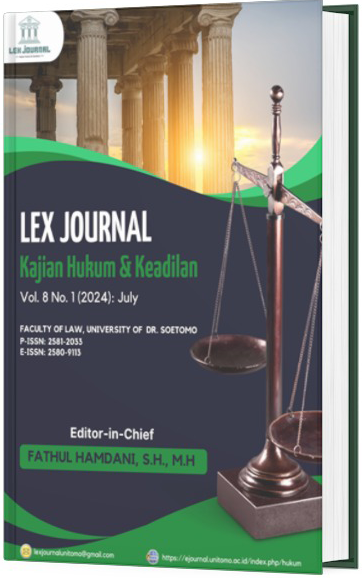Legal Implications of Wiretap Evidence in the Terrorism Investigation Process
 Abstract views: 50
,
Abstract views: 50
,
 PDF downloads: 51
PDF downloads: 51
Abstract
Wiretapping evidence has an important role in the investigation process of terrorism, considering the nature of this crime which tends to be organized, secretive, and involves cross-regional networks. Wiretapping allows law enforcement officials to obtain information and evidence that cannot be accessed through conventional methods. This article discusses the position of wiretapping results in the investigation process, and the strength of wiretapping results in the investigation process. Based on applicable legal provisions, such as Law No. 19/2016 on the Amendment to Law No. 11/2008 on Electronic Information and Transactions and Law No. 5/2018 on the Eradication of the Criminal Acts of Terrorism, wiretapping is recognized as valid evidence provided that it is conducted based on a court order or special procedures regulated by law. However, its implementation faces various challenges, including potential violations of privacy rights, abuse of authority, and supervision of the wiretapping process. This research aims to evaluate the effectiveness of wiretapping evidence in supporting the investigation of terrorism crimes while highlighting the importance of balance between law enforcement and human rights protection.
References
Makarin, Edmon, Kompilasi Hukum Telematika (Jakarta: Raja Grafindo Persada, 2004).
Peter Mahmud Marzuki, Penelitian Hukum, 13 ed (Jakarta: Kencana, 2017).
Sabian, Utsman, Menuju Penegakan Hukum Responsif (Yogyakarta: Pustaka Pelajar, 2008).
Wisnubroto, Al & G Widiartana, Pembaharuan Hukum Acara Pidana (Bandung: Citra Aditya Bakti, 2005).
Journal
Fauzia, Ana & Fathul Hamdani, “Aktualisasi nilai-nilai pancasila dan konstitusi melalui pelokalan kebijakan Hak Asasi Manusia (HAM) di daerah” (2021) 2:2 J Indones Berdaya 157–166.
———, “Analysis of the Implementation of the Non-Conviction-Based Concept in the Practice of Asset Recovery of Money Laundering Criminal Act in Indonesia from the Perspective of Presumption of Innocence” (2021) 11:1 J Jurisprud 57–67.
Fauzia, Ana, Fathul Hamdani & Deva Gama Rizky Octavia, “The Revitalization of the Indonesian Legal System in the Order of Realizing the Ideal State Law” (2021) 3:1 Progress Law Rev 12–25.
Suatmiati, Sri & Edy Kastro, “Legal and Institutional Framework on Counter-Terrorism in Indonesia” (2020) 27:1 J Media Huk 68–78.
Website
Hukum Online, “Jerat Hukum dan Contoh Terorisme di Indonesia,” (2023), daring:
Wahyuni, Willa, “Penerapan Alat Bukti Petunjuk dalam Peradilan Pidana,” (2022), daring: Huk Online
Copyright (c) 2024 Moh Taufik, Andre Khalil M. Putera Lato, Renda Aranggraeni

This work is licensed under a Creative Commons Attribution-ShareAlike 4.0 International License.









